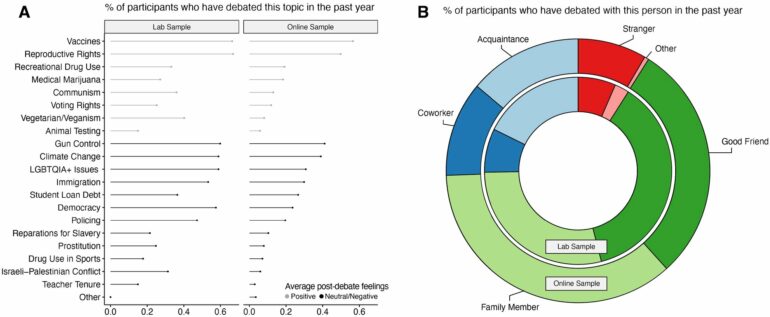Spend any time scrolling through social media or news sites and it feels like America is a nation in constant argument. Off-hand remarks often spark fierce screaming matches. Partisanship is up, Gallup tells us, while trust in institutions is down.
However, a new study co-authored by Berkeley Haas Assistant Professor Erica R. Bailey suggests this perception may not accurately reflect the nature and frequency of political debates among everyday Americans. In three studies involving nearly 3,000 participants, researchers found most debates occur not with strangers on social media but rather among family and friends. Moreover, participants often felt positive after such discussions.
“We have these misperceptions because of algorithmic amplification of negative media and negative interactions on social media coupled with the fact that we tend to really remember negative information,” says Bailey. “It creates this perception that we’re all just out there fighting with strangers.”
In fact, one study with a representative sample of nearly 2,000 Americans showed that people overestimate how frequently others engage in debates—and this misperception is especially pronounced for debates with strangers online. This false perception has psychological costs, the researchers say, fueling increased feelings of hopelessness about the future of America.
“Our findings suggest that Americans may experience a false reality about the landscape of debate which can unnecessarily undermine their hope about the future,” the researchers wrote in the study, published in the journal Scientific Reports and co-authored by Michael W. White, Sheena S. Iyengar, and Modupe Akinola of Columbia Business School.
Difficult and nuanced conversations
Bailey says the genesis of the project was reflecting on her own experience. “When I think about who I talk about hot-button issues with, it’s my colleagues and friends,” she says. “Engaging online feels like a waste of time. Why would I have a difficult and nuanced conversation with someone I don’t know or trust?”
Bailey, who studies authenticity, says online debates often feel artificial, with people less willing to openly share their personal experiences and more often just trying to make a point. But while we have a daily ringside seat to the most heated online debates, we lack line-of-sight into people’s private kitchen-table conversations—and these are harder for researchers to observe, recreate, and measure.
Perceptions of ‘typical’ debates
In their first study, the researchers asked 282 participants to freely recall a recent debate they had witnessed or participated in. About half of the participants described debates they observed online, and recounted that these interactions skewed more negative than positive.
Interestingly, the respondents believed these instances were representative of typical debates, highlighting a perception that debates—particularly online—are generally seen as negative.
Personal experiences with debate
The second phase included two studies delving into personal debate experiences. The first involved 215 people in a behavioral science research lab, while the second included 526 individuals recruited online.
Participants in both groups were asked about the topics they debated over the past year, who they debated with, and how they felt afterward. They were also asked to choose from a list of twenty common topics—including climate change, gun control, gender identity issues, and reparations for slavery—which ones they had debated.
The results revealed that reproductive rights and vaccines were the most common topics, while other contentious issues, such as policing and immigration, were debated less frequently. Most of the topics were debated by less than half of participants. Contrary to the popular belief of hostile online interactions, participants said the majority of their debates occurred with family, friends, and other close contacts.
In terms of emotional impact, online participants reported that their average post-debate feeling was positive, suggesting that discussions, even on divisive topics, often ended on a constructive note. The lab participants’ feelings were neutral, neither overwhelmingly positive nor negative.
“That was surprising to me, since I was not expecting for people to report feeling positive after a debate,” Bailey says. “That suggests that at least on some topics, people are better at finding a compromise or at least ending on a positive note.”
Measuring misperceptions and their impact
The third study was an investigation into how Americans perceive debates compared to their actual experiences. About 2,000 Americans in a nationally representative sample were randomly assigned to either self-report their own debate experiences or to predict how often others engage in debates.
The results were striking. Across almost all categories, people significantly overestimated the frequency of debates, especially online debates involving strangers (the exception was in-person debates with family members). In addition, this overestimation was strongly linked to a sense of hopelessness about the future of America.
Implications
The research highlights a critical gap between perception and reality. “Taken together, these findings suggest that the ‘typical’ debate seems substantively different than two strangers typing at one another from behind their computer screens,” the researchers write. This misperception could be due to the visibility and virality of negative content on social media platforms, where extreme views often get amplified over moderate or conciliatory tones.
Second, the findings suggest that these misperceptions could be contributing to broader societal despair regarding the political climate and the future of democracy in America. By assuming that debates are overwhelmingly negative and frequent, people may feel a sense of futility about political engagement and discourse. (The researchers cautioned that this connection was largely correlational.)
Lastly, the research points to the need for interventions that not only make debates more productive but also adjust public perceptions about political debate. Educating the public about the actual dynamics of debates could help mitigate feelings of hopelessness and encourage more constructive and hopeful engagement with political processes.
More information:
Erica R. Bailey et al, Americans misperceive the frequency and format of political debate, Scientific Reports (2024). DOI: 10.1038/s41598-024-55131-4
Provided by
University of California – Berkeley
Citation:
Our political debates may not be as antagonistic as we think, study shows (2024, May 29)



